How To Budget For Your Wedding Bar
Allow us to kill your buzz.
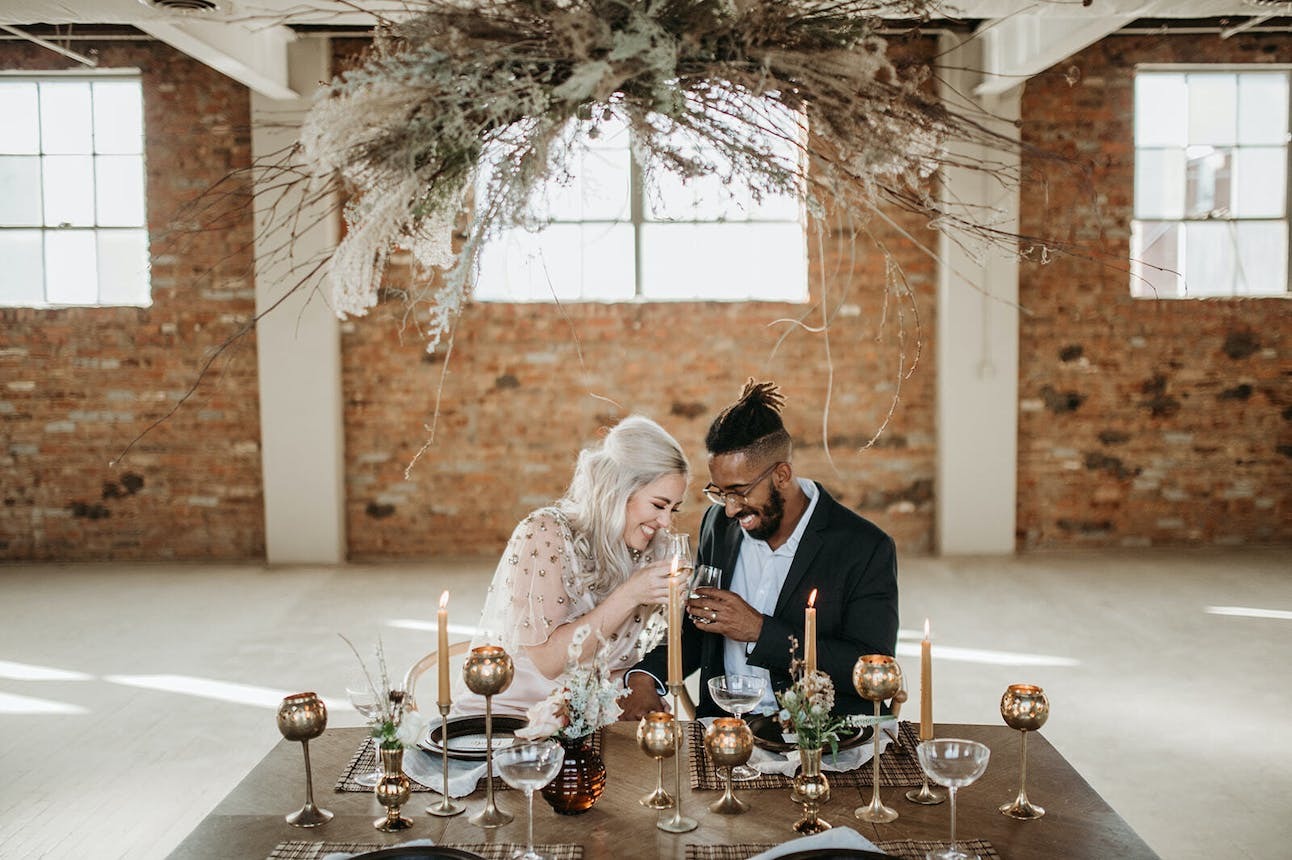
Tenth Ward Distilling Company | Paula B Photography
Want a sobering experience? Try calculating the cost of your wedding bar. Sure, you can guess how many bottles of beer and wine you may need based on your guest count...but then there's bartenders and mixers and glassware, oh my!
If you're going the BYO alcohol route – meaning bar service isn't provided by your caterer or venue – what do you need to calculate and consider?
But even if your bar is included...what bar options are there, how much do they generally cost, and what else do you need to know to make an informed decision?
That's where we swoop in to save the day. From figuring out what you'll pay to picking the perfect bar package, here’s the scoop on how to budget for your booze.
Let’s Get into the Spirit(s)
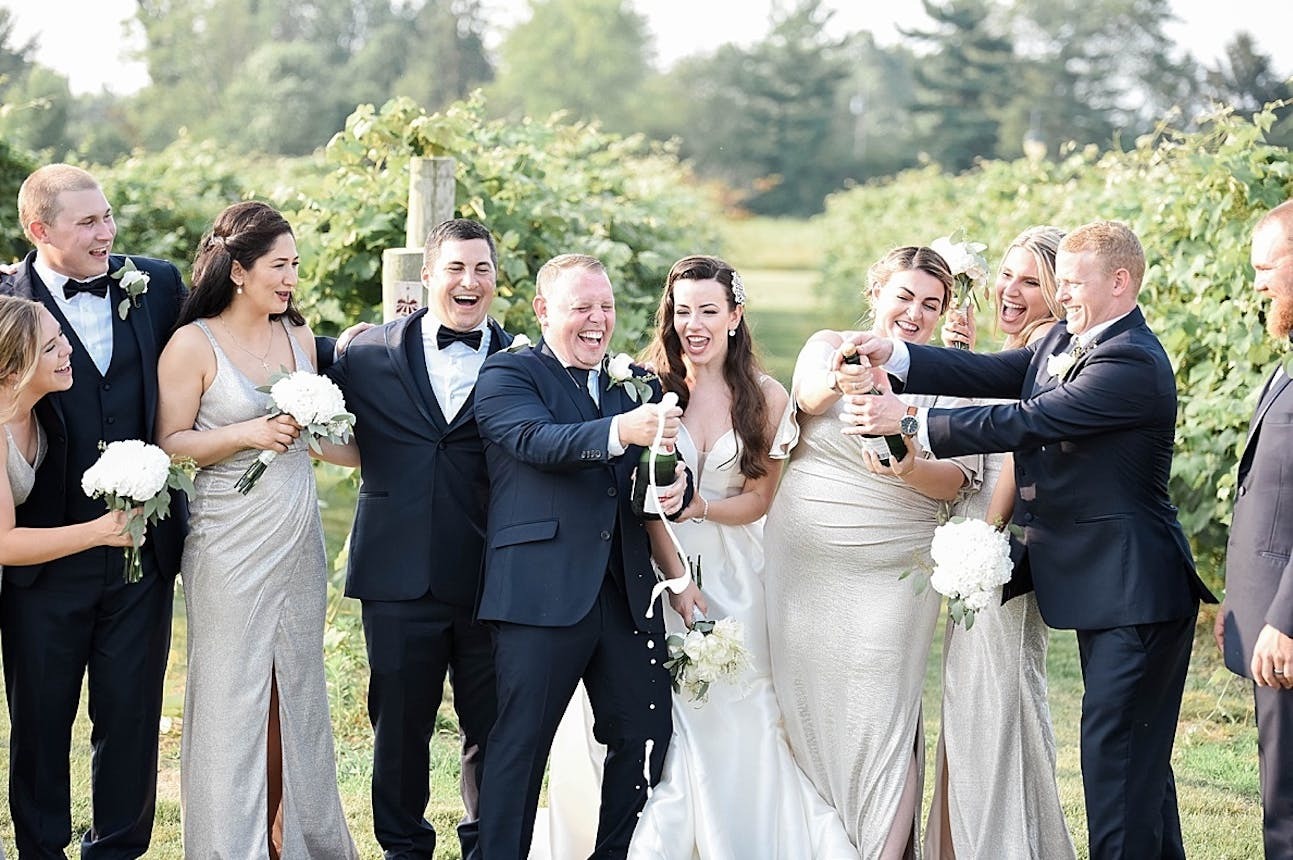
How much does it cost to have a bar at your wedding?
You can expect to allocate between 8–20% of your total wedding budget to the alcohol and bar service, depending on how much you're willing to cover and how much your collective guest list likes to imbibe.
Here are the different pricing structures you’ll likely encounter:
- Price By Consumption: Pricing by consumption means you’ll get charged for the amount of alcohol your guests drink. This total is calculated by the bar staff at the end of the event.
- Pro: You’ll only pay for what you and your guests actually consume.
- Con: If your guests overindulge, you could end up spending much more than you anticipated.
- Price Per Person: Also known as “Bar Packages” or “Flat Rate” pricing, the price-per-guest model is a fixed rate for a set number of hours.
- Pro: There are no surprises!
- Con: If your guests don’t drink as much as you’d anticipated, you could end up spending more than you should have.
The per-person cost for alcohol varies greatly depending on your location and bar package, but generally you can expect to spend anywhere from $15–45 per person—or more! #topshelfdreams #beerbudget
Pro Tip: Food and alcohol account for the greatest portion of an event’s budget; consequently, food & beverage selections are a big deal. Couples typically do a menu tasting—but don't forget to try the drinks, too! With such a big investment, it’s wise to taste wines and beers in advance, and be very specific about hard alcohol selections.
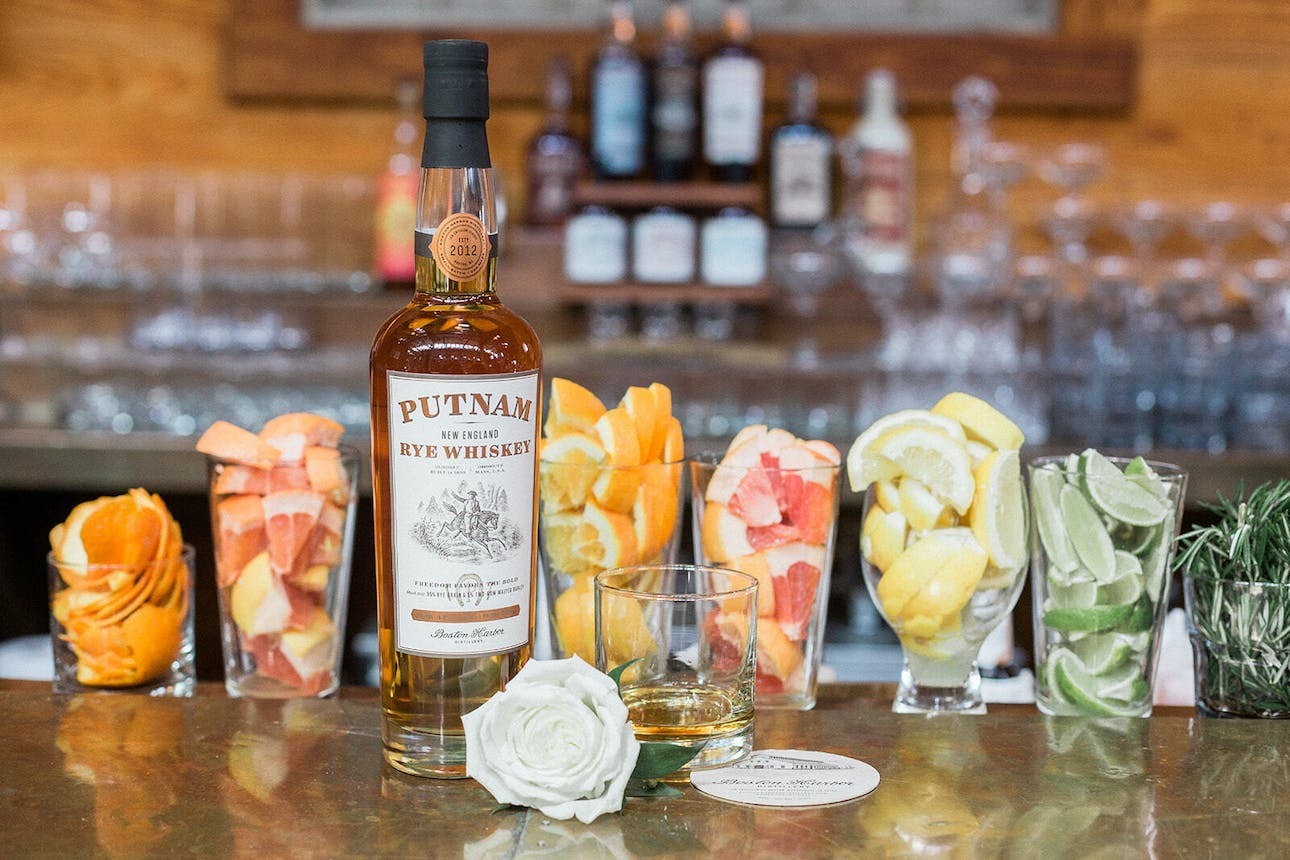
Boston Harbor Distillery | Meredith Jane Photography
What are the different wedding bar options and prices?
From premium open bars to limited and even cash bars, there are various ways to make your wedding bar fit your budget. Here are 5 different types of bar packages to consider:
1. Open Bar
What cocktail-loving wedding guest doesn’t love an open bar? This is one of the most popular bar options for weddings. The host of the wedding picks up the tab, and guests can drink as much as their hearts desire—whether it’s a premium or more limited selection of alcohol.
An open bar has fixed-rate or per-person pricing: The cost has been calculated in advance of the event and prepaid by the host. There is an hourly rate plus a bartending fee, and is based on an estimate of how much alcohol your guests will drink. Rates can vary based on the quality of alcohol, number of guests, and the venue.
- Average Cost of an Open Bar: Generally you can expect to spend anywhere from $15–45 per person or more, depending on your location and alcohol selections.
- Pro of an Open Bar: There are no surprises when it comes to cost! A flat rate is the best option if your guest list likes to drink.
- Con of an Open Bar: If your guests don’t drink as much as you’d anticipated, you could end up spending more than you should have.
Open Bar Tip: You can offer an open bar that’s still budget friendly by only hosting for a set number of hours. For example, you can end open bar service an hour before the reception ends, or just pay for the first couple of hours. From there, the cash bar opens up. Just let your guests know about this caveat in advance so they’ll come prepared to pay for additional drinks!
2. Hosted Bar
A hosted bar is very similar to an open bar in that guests can order as many drinks as they’d like on the host’s tab. The difference is in how it’s priced.
A hosted bar is priced by consumption: This means you’ll get charged for the amount of alcohol your guests consume or the amount of bottles opened. This is tallied up by the bar staff at the end of the event.
- Average Cost of a Hosted Bar: This depends on how much alcohol your guests drink, as well as the types of alcohol hosted. A good estimate is that each adult guest will consume at least 6 drinks on average during a 5-hour reception.
- Pro of a Hosted Bar: You’re essentially paying per drink, so there’s no risk of paying for alcohol that your guests don’t end up consuming.
- Con of a Hosted Bar: If your guests overindulge, you could end up spending more than you anticipated—which isn't the surprise you want at the end of your wedding night.
3. Cash Bar
This is a *no-host* bar where guests are required to pay for their own drinks. This option is best for cash-strapped couples on a tight budget, as your wedding guests can help lessen the financial burden while still being able to drink what they want. Just do your due diligence in making sure guests know well in advance that they’ll need to cover their own bar tabs.
- Average Cost of a Cash Bar: You’ll most likely still need to cover the costs of setup, bar fees, and/or bartenders, which can range anywhere from $50–200 or more per bartender (oftentimes plus tax). Be sure to ask your venue or caterer about any extra charges you'll be responsible for. You should also cover the tip, which is 10% to 20% of the total alcohol bill to be split among the bar staff.
- Note: It’s impolite for there to be a tip jar, as tipping should be up to the discretion of your guests and not encouraged or expected.
- Pro of a Cash Bar: It’s the most budget-friendly way to provide a wedding bar.
- Con of a Cash Bar: It doesn’t provide the best guest experience.
Cash Bar Tip: Consider offering drink tickets to your guests. These are prepaid by the host so that the first drink or two is on you. From there, guests can decide if they’d like to pay for more.
4. Limited Bar
Typically this option limits the wedding bar to just beer and wine (and perhaps a signature cocktail). Opting to serve beer and wine only is a fantastic way to have that open-bar feel without the exorbitant price tag. You stand to save a substantial amount of money by not offering every type of liquor under the sun.
- Average Cost of a Limited Bar: Generally you can expect to spend anywhere from $12–30 per person or more, depending on your location and beer and wine selections.
- Pro of a Dry Bar: No hangovers or risk of drinking and driving.
- Con of a Dry Bar: Some guests may be mighty disappointed.
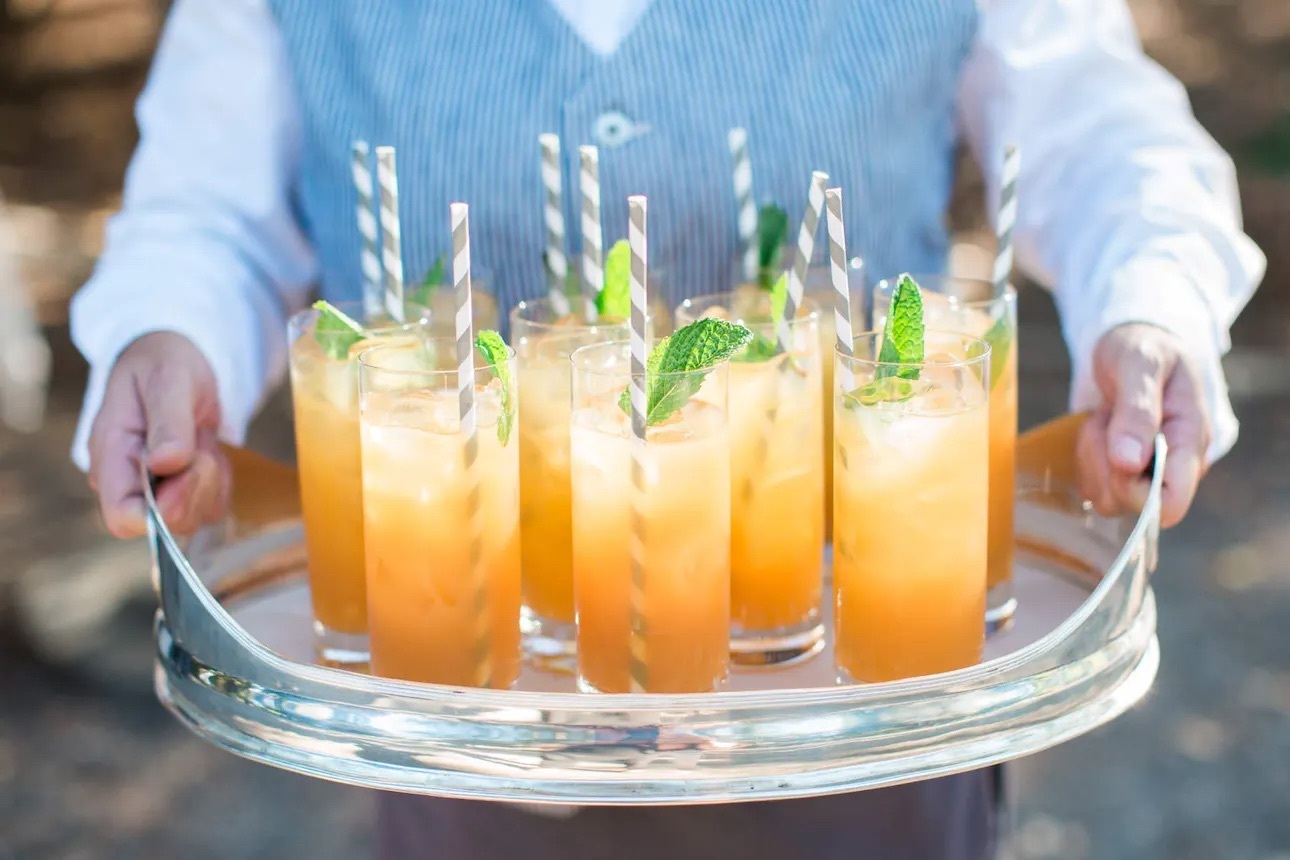
Paula LeDuc Fine Catering & Events
Who provides the alcohol for a wedding?
It depends! Here are the three most popular options:
1. Your Venue
The most convenient option is to get married at a full-service wedding venue that has in-house catering and bar service—with all the bells and whistles and bartenders already included. You won’t have to worry about calculating the amount of alcohol you need or how many glasses to rent or who’s cleaning up at the end of the night. The only downside is that this is one of the costlier options!
But regardless of what type of venue you choose, they’re going to have their own regulations around alcohol. Here are the policies wedding venues may have in place:
- In House: the venue provides alcoholic beverages (for a fee) and does not permit you to bring your own
- BYO: you can bring your own alcohol
- Corkage Fee: if you bring your own alcohol, the venue charges a fee per bottle to remove the cork and pour
- WCB Only: (or any combination of these three letters) only wine, champagne, and beer are permitted
- Food & Beverage or Bar Minimum: A minimum amount that spend that you must spend on food and/or drinks to hold your event, not including tax and tip
- Licensed Server Required: the server of alcohol must be licensed
Pro Tip: Look into wedding insurance. Host Liquor Liability coverage is required by many wedding venues and may protect you if you are held financially liable for property damage or alcohol-related incidents arising from your wedding.
2. Your Caterer or Professional Bar Service
If your venue doesn’t provide an in-house caterer or bar service, you’ll need to hire an outside caterer or beverage catering service with licensed bartenders. Working with professionals ensures you’ll have adequate alcohol and mixers, bartenders to serve drinks, barbacks to whisk away dirty glasses and abandoned bottles, and a clean-up crew to take it all away at the end of the night.
If the catering company you hire isn’t full service, make sure you’re clear on what they provide—and what they don’t. From bar mats and cocktail shakers to the alcohol itself, this will vary from company to company and state to state.
Pro Tip: You'll most likely see a service charge, tax, and gratuity included in your contract. But if it isn't, etiquette suggests tipping your bartenders 10–20% of the alcohol bill (to be split among them) at the end of the reception.
3. You Bring Your Own
If your venue allows, you can opt to BYO alcohol, which you can buy in bulk at normal, non-marked-up prices. Along with mixers, garnishes, glassware, ice, etc. etc. This option gives you control over what you’re serving and what you spend; however, it can be a real headache to cover all your bar bases.
Don’t neglect thinking about all the extras you may need: from the physical bar itself to strainers, shakers, and even straws and stir sticks. Take all of this into consideration before deciding if a DIY bar is the best use of your time, energy, and budget.
With the BYO option, you may encounter a corkage fee ranging anywhere from $1–$10 per bottle, depending on your venue and location. It covers the costs for the service staff to uncork, pour, and serve the alcohol to your guests.
If you provide the alcohol, make sure you look into your state’s liquor laws to ensure everything is above-board. And keep your purchase receipts so you can return any unopened bottles, if your state allows it!
Pro Tip: Even with BYO alcohol, you'll still want to hire a professional bartender to serve your guests. Depending on your state and venue, they may need to be licensed and insured.
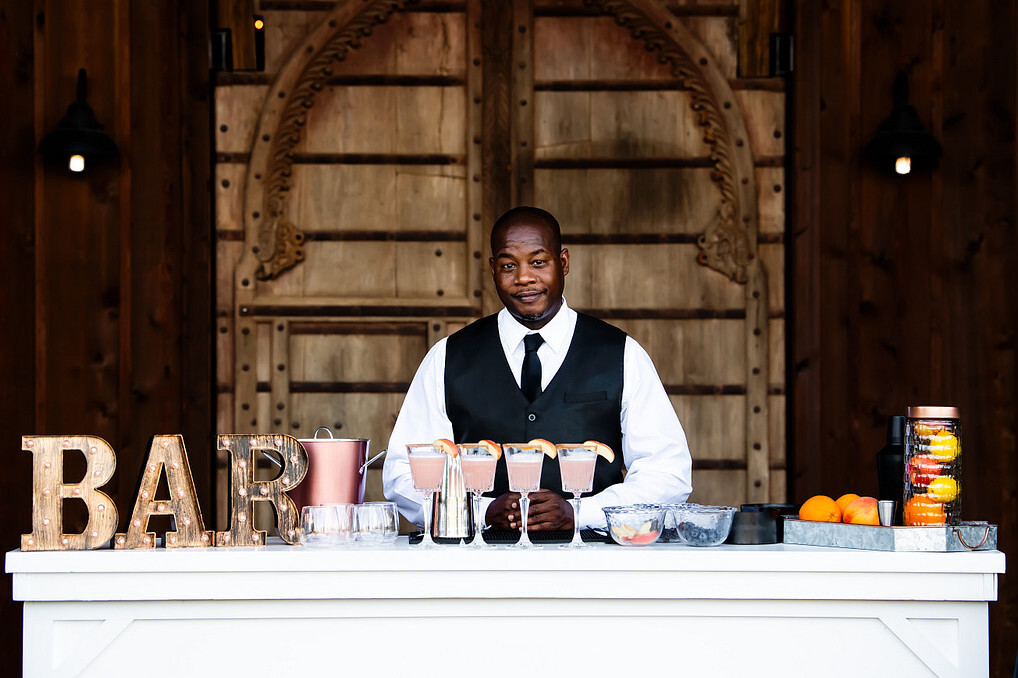
Lucky Spur Ranch Retreat | Blackall Photography
How much alcohol should I buy for my BYO wedding?
This answer will vary greatly based on your overall budget, guest count, and the duration of your wedding, but a general guideline is to allot at least two drinks in the first hour and one drink for every additional hour to each adult guest. Some will drink more, of course, but some will drink less…so this is a solid starting point for an estimate. The average wedding keeps the bar open for up to 5 hours.
Here’s a quick calculation:
100 Adult Guests + 5 Hour Reception = 6 Drinks Consumed Per Guest*
*This calculation will vary based on your particular guest list. If you're inviting your rowdy college friends and shot-drinking cousins, your "drinks per guest" total will be higher.
While it's often stated that 50% of guests want wine, 25% want beer, and 25% want spirits, the intoxicating combination is ultimately up to you. Serve whatever drinks you think your guests will like!
Here's how much you’ll get from each bottle:
- Wine: A 750 ml bottle of wine contains about 5 glasses
- Champagne or Sparkling Wine: A 750 ml bottle will fill 6 flutes
- Liquor: A 750 ml bottle will make 16 mixed drinks
- Beer: A 15.5 gallon half-barrel keg is around 124 pints
- Mixers: You'll want at least 1 liter of soda, tonic, or juice for every 3 guests
Here's how much you’ll get from each case:
- Wine: One case of wine has 12 bottles
- Beer: One case of beer has 24 bottles or cans
Pro Tip: Buy more than you think you'll need – just in case. It's always wise to overestimate and overbuy so your wedding bar doesn't run dry!
Here are some questions that can help you determine your alcohol totals:
- How many adult guests are you going to have?
- How many hours is your reception going to be?
- Will you have a cocktail hour?
- Will you serve drinks pre-ceremony?
- Will you have a champagne toast?
- Do you want to provide wine for the tables?
- Do you want to offer premium, top-shelf alcohol or more generic house options?
- Will you offer a full open bar with spirits or just beer and wine?
- Will you be offering one or more signature cocktails?
- What types of garnishes and mixers will you need?
Also keep in mind that you should have at least one bar and two bartenders per every 100 guests. If you have more than one bar, it’s best if they’re placed in opposite locations to avoid a bottleneck. Pun intended.
Remember that these are all just general guidelines. If you want to get a bit more precise, go through your guest list and highlight the adults who will most likely be drinking—and estimate how heavily. Adjust amounts and percentages accordingly.
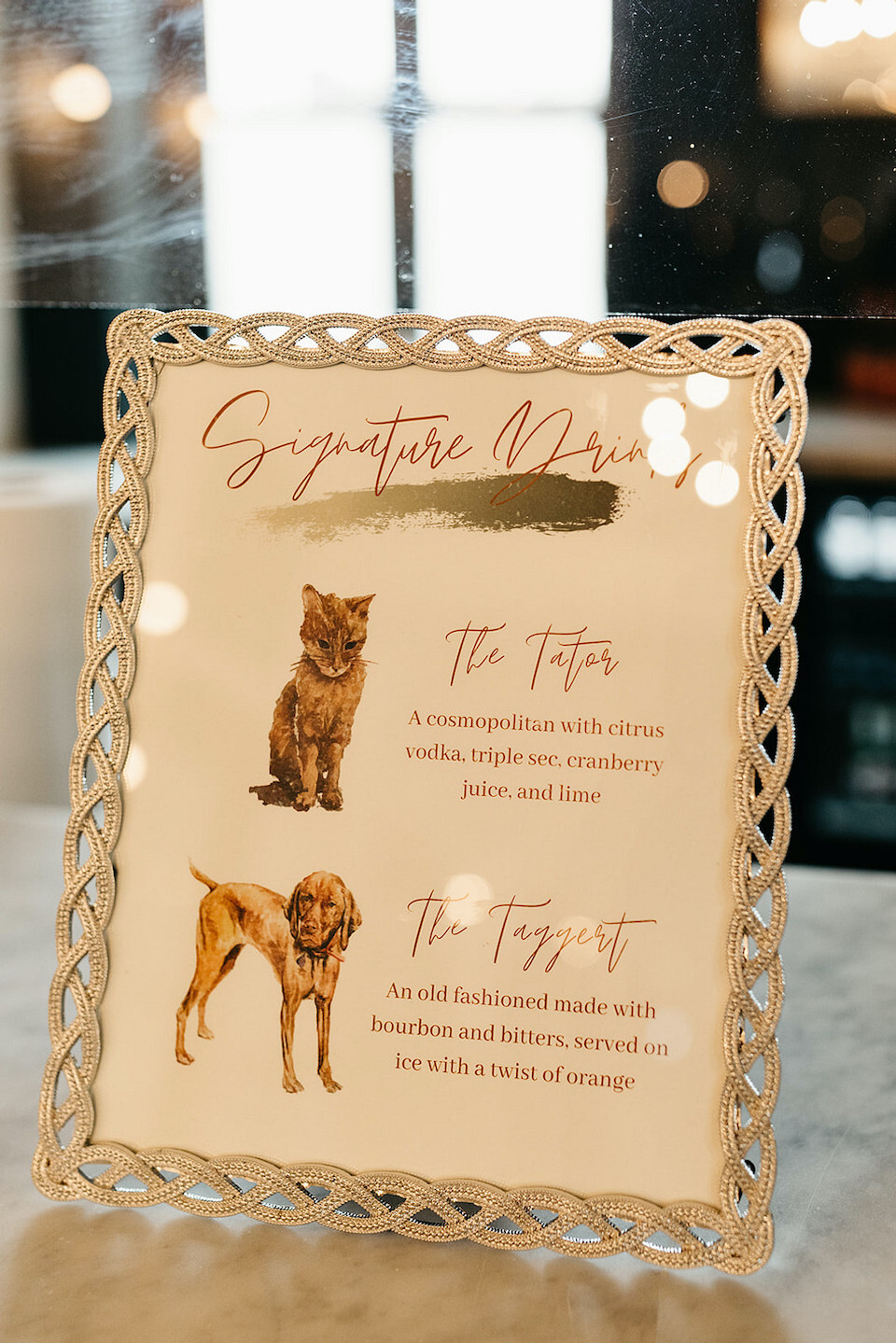
Company 251 | We Are The Bowsers
How can I save money with my wedding bar?
- Opt for a Limited Bar with just beer and wine. Signature cocktail optional.
- Host the bar for as long as you can, then switch to a cash bar (often referred to by venues as a Maximum Capacity bar).*
- Offer your guests drink tickets for a certain number of hosted drinks, then switch to a cash bar.*
- *Always inform guests in advance if they’ll need to pay for their own drinks.
- Don't feel like you have to pay extra for a champagne toast! Very few guests actually drink the champagne, and they can toast to you with their favorite hosted beverage instead.
- Host an off-season or weekday wedding. You’ll most likely enjoy significant savings all around by embracing an off-peak wedding date.
- Host a shorter reception. Cutting down on the number of hours you host the bar will invariably cut costs. You can even arrange an afterparty at a local bar to keep the party going without feeling like you need to pick up the bar tab.
- Cut down your guest list. It must be said: More guests = more money. So this is the quickest way to slash your wedding budget from the start.
- See if your venue will exclude non-drinkers from their per-person rate. If you have a good amount of underage, sober, or pregnant guests, it doesn’t hurt to ask!
- Consider BYOB. It’s pretty complicated to calculate and manage this aspect of your wedding, but buying your own alcohol in bulk has the potential for big-time savings.
- Host a wedding brunch! People may be less inclined to overindulge during the day, and you can offer a more limited selection of morning-friendly beverages, like a mimosa or bloody mary bar.
- Review your contracts carefully. Make sure you ask about every service provided and are clear about all of the extras that can really add up. Read all the fine print before you sign any contract.
Although this part of the wedding planning process can be dizzying, the main thing is the satisfaction and safety of you and your guests. So do all your research, invest in licensed bartenders and liability insurance, and provide lots of water, ample transportation, and designated drivers.
Now you’re ready to eat, drink, and get married!
Thirsty for More?
- 15 Non-Alcoholic Wedding Bar Ideas
- The Ultimate Wedding Budget Checklist
- 37 Ways To Save Money On Your Wedding
Are we friends yet? Join MyGuide for more goodness!
Some clients may have paid to be placed in our editorial and some of these links may be affiliate; however, we never include a venue, vendor, or product unless they have a proper place here. This is part of our Core Values. We create our website first and foremost to be good for the couples using it to plan their Big Day. We won't stray from that for a few advertising dollars. #scoutshonor

